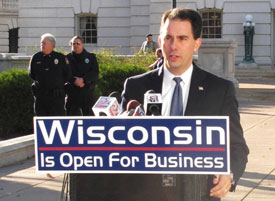Nov. 9, 2010 at 2:46 p.m.
Filed under:
Policy,
Politics,
Transportation,
Updated
By Associated Press

Wisconsin governor-elect Scott Walker speaks to reporters Nov. 3, 2010. (AP Photo/Scott Bauer)
High-speed rail projects in Wisconsin and Ohio appear close to derailment, with Wisconsin’s outgoing governor saying Monday he’ll leave the future of his state’s project to his Republican successor, who has vowed to kill it, and Ohio’s incoming governor saying again he plans scrap his state’s project.
Jim Doyle, Wisconsin’s outgoing Democratic governor, told The Associated Press that although he thinks a high-speed rail line to connect Milwaukee with Madison is a good idea, he feels obligated to leave the project’s future up to Republican Gov.-elect Scott Walker.
Minutes after Doyle made his comments, Walker said he remains opposed to the $810 million project. Get the full story »
Oct. 29, 2010 at 3:23 p.m.
Filed under:
Advertising/Marketing,
Media,
TV
By Associated Press
For TV viewers, this cutthroat election year is a riot of attack ads and media saturation made possible by big-money donors. For TV stations, it’s a stimulus package.
One research group expects TV political spending to hit a record $3 billion. The windfall may continue well past Election Day because regular advertisers are getting squeezed out of the schedule and could spend their ad budgets later.
Oct. 5, 2010 at 4:44 p.m.
Filed under:
Politics,
Real estate
By Clout Street
Rahm Emanuel’s residency in Chicago is likely to be a legal as well as political issue in the race for mayor, but since he returned last weekend from Washington there is a more simple question: Where is Emanuel living now?
The answer, according to his spokeswoman, is that Emanuel is leasing a condominium on the edge of West Town and River West.
Aug. 25, 2010 at 1:34 p.m.
Filed under:
Corporate governance,
Government,
Investing,
Policy
By Associated Press
The Securities and Exchange Commission on Wednesday approved changes that make it easier for shareholders to nominate directors of public companies.
The 3-2 vote allows groups that own at least 3 percent of a company’s stock to put their nominees for board seats on the annual proxy ballot sent to all shareholders. The new financial overhaul law enacted last month gave the SEC the authority to make the change. Get the full story »





